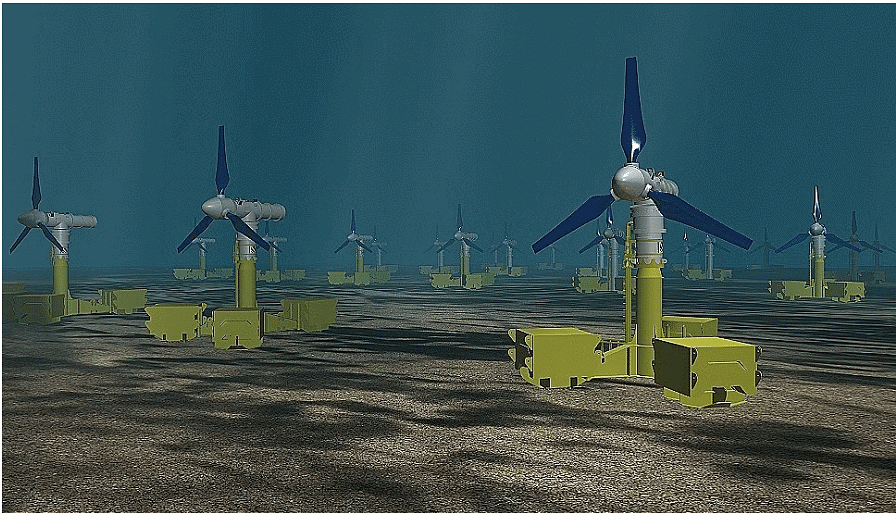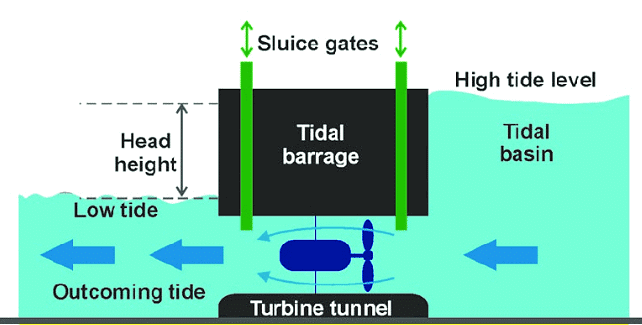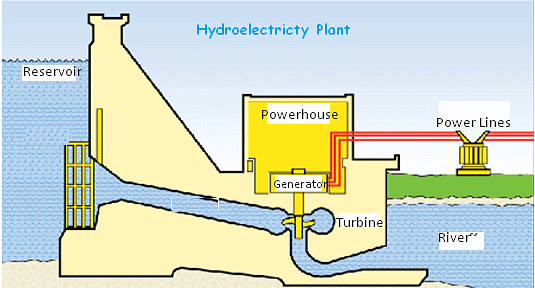Class 10 Exam > Class 10 Notes > Physics for GCSE/IGCSE > Energy from Water
Energy from Water | Physics for GCSE/IGCSE - Class 10 PDF Download
Wave & Tide Power
- The movement of waves or tides can be harnessed to rotate a turbine, generating electricity.
 Underwater turbines generate electricity
Underwater turbines generate electricity

Advantages
- No pollution is associated with nuclear power.
- It is dependable and capable of generating significant electricity rapidly.
- Considered a renewable energy source.
- Miniaturized systems are being created to supply power to small islands.
Disadvantages
- Costly infrastructure development.
- Impact on delicate ecosystems.
- Limited suitable sites for implementation.
- Technological constraints for large-scale energy generation.
Question for Energy from WaterTry yourself: What is one advantage of wave and tide power?View Solution
Hydroelectric Dams
- Water stored at an elevated position possesses gravitational potential energy.
- This energy can be converted into kinetic energy by allowing the water to descend a slope.
- The movement of the water drives a turbine, producing electricity.

Advantages
- Can adapt to demand, ensuring reliability and accessibility.
- Capable of producing substantial quantities of electricity on a large scale.
Disadvantages
- Requires valley flooding during construction, leading to habitat, town, and village destruction.
- The pumping systems may emit significant quantities of greenhouse gases.
Question for Energy from WaterTry yourself: Which of the following is an advantage of hydroelectric dams?View Solution
The document Energy from Water | Physics for GCSE/IGCSE - Class 10 is a part of the Class 10 Course Physics for GCSE/IGCSE.
All you need of Class 10 at this link: Class 10
|
126 videos|182 docs|35 tests
|
FAQs on Energy from Water - Physics for GCSE/IGCSE - Class 10
| 1. How do wave and tide power differ from hydroelectric dams? |  |
Ans. Wave and tide power harness energy from the motion of waves and tides, while hydroelectric dams generate electricity by using the force of flowing water from rivers or reservoirs.
| 2. What are the advantages of wave and tide power compared to hydroelectric dams? |  |
Ans. Wave and tide power are considered more environmentally friendly as they do not require the construction of large dams that can disrupt ecosystems and habitats. They also have the potential to be more predictable and consistent sources of energy.
| 3. How efficient are wave and tide power technologies in generating electricity? |  |
Ans. Wave and tide power technologies are still in the early stages of development, so their efficiency can vary. However, advancements in technology have improved their ability to generate electricity, making them more viable options for renewable energy.
| 4. Are there any challenges or drawbacks associated with wave and tide power? |  |
Ans. Some challenges with wave and tide power include the high initial costs of implementing these technologies, as well as the potential impact on marine life and coastal ecosystems. Additionally, the reliability of wave and tide power can be influenced by weather conditions.
| 5. How can wave and tide power contribute to the overall energy mix? |  |
Ans. Wave and tide power have the potential to complement other renewable energy sources, such as solar and wind power, by providing a reliable source of electricity that is not dependent on weather conditions. Integrating wave and tide power into the energy mix can help reduce reliance on fossil fuels and mitigate the effects of climate change.
Related Searches















